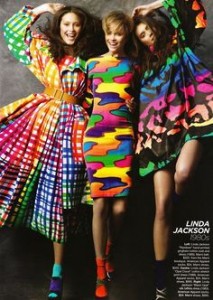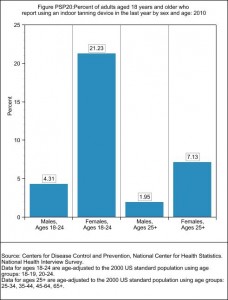I wanted to figure out if the clothing we wear really does say something about us. Not only if it said something about us, but if it affected the people around us. Will the color I wear today make an impression on you?
Causation: The color I’m wearing effects emotions
Reverse Causation: Emotions effect the color I’m wearing
Third variable: The season in which we wear the color. What I mean by that is red is considered a winter color in the fashion world, and orange would be seen as a summer color. Maybe wearing those colors at the wrong time would not have the same effect on someone.
Women’s Health Magazine made quite a point of this. It said : “The serene shade [blue] soothes the person wearing it and makes the people around them feel at ease, say researchers at the University of British Columbia” (Dold). So now you know that you are probably more relaxed when you are wearing blue, and so are the people around you. When I want to create an ease filled environment I’ll remember to fill it with blue. It creates a vibe that makes you relax.
The article also said, “Psychologists at the University of Rochester found that men are more attracted to women wearing the ruby hue” (Dold). People love red. It is the color that gets the most attraction from the eyes and the brain. It is very easy to notice something in red because of the attraction levels it causes us as a people. Mistakes are corrected with red, red cars always get pulled over more often, there is always a woman in a red dress ect. Taylor Swift even wrote a song about feeling Red, if that counts for anything that relates to emotion. Because she is the mostly renown as an artist for her emotions.
It also continued on to the color of creativity, “Whenever you want to feel inspired, pull on something purple” (Dold). If you need to write a blog and need to sit down and get it done, you should probably put on purple. It will get the creative juices flowing and you will be inspired soon enough. This is probably because purple is not a common color. It is a color that you must be inspired to wear. Something makes you want to put on purple because it is the farthest thing from basic.
Furthermore it said that, “The preferred shade of fashionistas, cops, and CEOs, black is the universal color of authority” (Dold). This should go unsaid. Black is the color of power, but it also seems to connote negativity. I suppose this is why the magazine made a connection between an authority and black.
It continued on with saying, “[Orange is] enthusiastic and inviting, you should wear it when you want to appear social, friendly, or approachable” (Dold). So if I put on orange will you feel more compelled to talk to me and be my friend? According to the article you will. Orange is a social color because it also draws attention, but not in an intimidating way.
The last one was that, “This hue [green] puts you and others in a good mood, according to research from the Vrije Universiteit in Amsterdam” (Dold). I guess this is because green puts people in a good mood anyway. It reminds you of nature and life and money. Good things are usually green. Except for the fact jealousy is greatly connected with green as well.
Works Cited
Dold, Kristen. “What Your Clothing Color Says About You.” Womenshealthmag.com. N.p., n.d. Web. 19 Sept. 2014.









